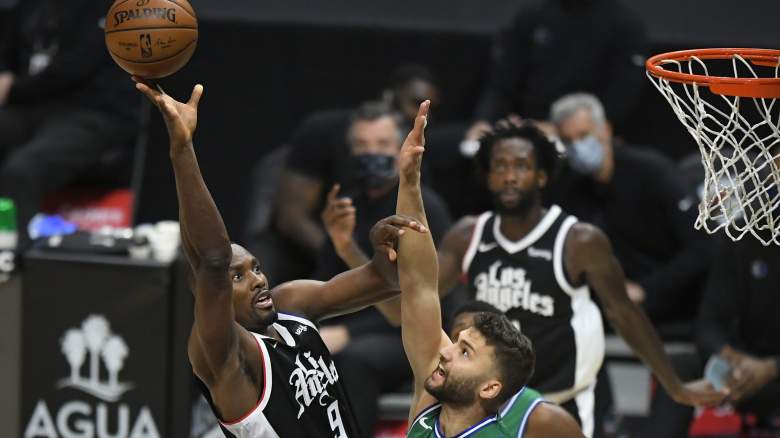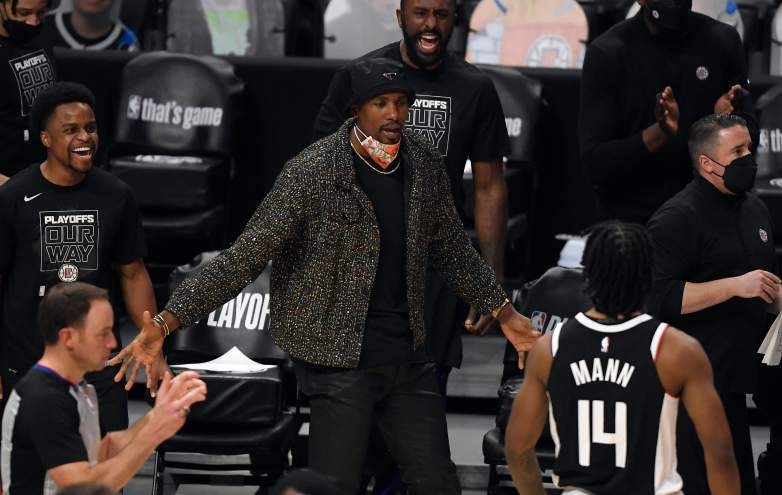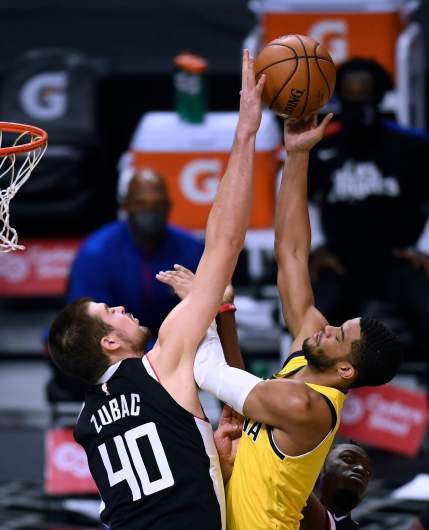
Getty
Ever since having back surgery in late May, it’s been generally expected that L.A. Clippers center Serge Ibaka would opt-in on his $9.7 million player option for 2021-22. By doing so, the nine-year veteran would forgo the opportunity to roll the dice as an unrestricted free agent this summer and set the stage for a measure of redemption following an injury-hampered season.
Turns out, that expectation was correct. On Saturday, Ibaka told Clippers management he had decided to return for another go-round, later tweeting “unfinished personal business #Grateful.”
This is, at least in theory, good news for the Clippers. The 6-foot-10, 235-pound Ibaka is a three-time All-Defensive selection with significant playoff experience who can guard on the perimeter and is still considered an elite rim protector. (Amongst active players, Ibaka trails only Dwight Howard for career blocks.) Offensively, his ability to shoot from three allows L.A. to spread the floor and create good looks off the pick-and-roll. For his career, Ibaka is averaging 12.5 points, 7.3 rebounds and 2.0 blocks while shooting 51.4% overall and 35.9% from behind the arc.
His decision also settles the first of several key personnel matters on L.A.’s docket this offseason — the biggest, of course, being the re-signing of injured forward Kawhi Leonard. Despite facing a lengthy rehab following recent ACL surgery, Leonard opted out of his $36 million player option just 24 hours after Ibaka opted in.
Follow the Heavy on Clippers Facebook page for the latest breaking news, rumors and content out of Clipper Nation!
Earlier in the week, before Ibaka or Leonard announced their decisions, the Clippers’ president of basketball operations, Lawrence Frank, said he hoped to see both veterans return next season, as well as unrestricted free agents Reggie Jackson and Nicolas Batum.
“We are hopeful that we can continue continuity and guys want to be here,” Frank told reporters.
But the reality is, when it came to Ibaka, the Clippers had no choice. A player option is, obviously, up to the player, and Ibaka was smart to not put his faith in a risk-averse open market to deliver him a raise. So he took the guaranteed money with the hope of a big payoff next summer. In the meantime, however, there are still plenty of questions about his health and effectiveness at this stage in his career, let alone what his inclusion will mean for some of his teammates.
All Things Considered, Zubac Could Be the Better Option
Ibaka had surgery on June 11, repairing a pinched nerve that he said had bothered him since the start of the season but which became unendurable on March 14 in a road loss to New Orleans. Ibaka was forced to leave the game after just eight minutes and would remain in street clothes (very fashionable street clothes, incidentally) until the second to last game of the regular season.
Having missed 30 straight games, it was hoped that Ibaka would be back in business for a long playoff run. But that hope soon faded, as Ibaka lasted just 19 minutes over Games 1 and 2 against Dallas before shutting it down for surgery.

GettyIbaka cheers from the sidelines
“It’s been a very tough season,” said Ibaka at the time. In 41 games, he averaged 11.1 points and 6.7 rebounds on 51.0% shooting from the field and 33.9% from three — all below his career averages (as were his 23.3 minutes, which were a career-low). “I worked very hard to be back in time for the playoffs but sometimes injuries get in the way and health has to be a priority.”
And there’s no doubt that he will work very hard to recover from his surgery, which is expected to result in a complete recovery. But given that Ibaka will turn 32 in September, nothing is guaranteed. There’s a good chance he will not be recovered enough to start the season on time, and, even if he does, there’s no guarantee what his role will be.
24-year-old Ivica Zubac took over starting center duties when Ibaka went out, and though he does not possess the inherent agility of Ibaka nor anything resembling an outside game, Zubac proved formidable defensively in the paint and was uncommonly durable. Zubac played in all 72 regular-season games (one of only 11 players to do so this season) and L.A.’s first 17 playoff games before suffering a sprained MCL that kept him out of the final two games against Phoenix. (Zubac is expected to be locked and loaded for the season.)

GettyZubac sends one back
Through the Clippers’ first 40 games, with Ibaka as the starter, L.A. had a 116.7 offensive rating and 111.6 defensive rating. However, in the remaining 32 games with Zubac as the starter, while the Clippers stayed essentially the same offensively, their defensive rating improved to 109.2. (The lower the better for defensive rating.)
It’s unknown who coach Ty Lue will go with as the starter next season, assuming both players are healthy, but Ibaka may not take kindly to coming off the bench. And it’s certainly not what he expected when the Clippers signed him as a free agent from Toronto before last season.
For the Clippers, Every Dollar Counts
Ibaka opting in also means that the Clippers — already cash-strapped and facing the prospect of Leonard eating up about $40 million while rehabbing — will have less flexibility for retaining Jackson and Batum, let alone for picking up another star to help fill Leonard’s void.
Without cap space (again, assuming Leonard re-signs), the Clippers will need to execute a sign-and-trade to acquire any free agents this offseason. If they do so, they will be hard-capped for the season, meaning they would be disallowed from exceeding the $143 million tax apron at any point. Ibaka’s return presumably puts them at $148 million, according to Spotrac, so trimming at least $5 million off is a necessity for any move that would hard-cap them.
For the Clippers, every dollar matters, and lacking a choice in regards to Ibaka’s $9.7 million the Clippers could be compelled to reduce their payroll by trading away — for peanuts — someone like Patrick Beverley, the longest-tenured player on the roster slated to make $14.3 next season. Or they could be forced to cut ties with Jackson and/or Batum. Forward Marcus Morris or guard Luke Kennard could also find themselves on the trading block as a money-saving measure or as part of the sign-and-trade.
Of course, if Ibaka can stay healthy and return to the form that made him a potent two-way force first with OKC and then Toronto (he played 56 games with Orlando in 2016-17) then most associated moves by the Clippers will seem justified in retrospect and Ibaka’s salary will feel like a huge bargain. But for now, the Clippers and Ibaka are stuck with each other, like it or not.
Comments
Lacking Options, Ibaka Returns to Clippers With Shot at Redemption